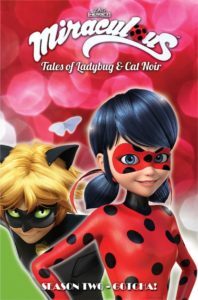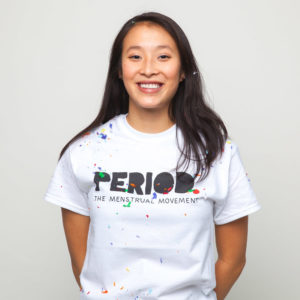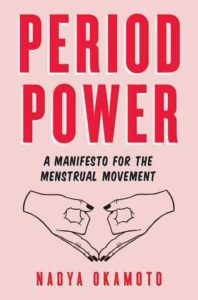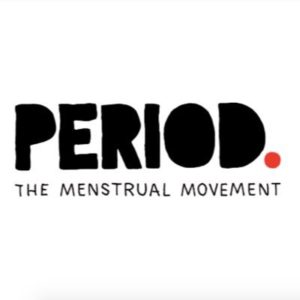Hey YA fans! I’ve got a really great interview to share today with a young author and activist you need to know.
“What’s Up in YA?” is sponsored by Action Lab.
 Based on the Animated Series by Zag Entertainment, Marinette is the sweetest girl in Paris. With a big crush on a boy at school, a big dream of becoming a fashion designer, and a big problem with being totally awkward, she’s just your average teenage girl, right? Did we mention she’s also the crime fighting superhero, Ladybug?
Based on the Animated Series by Zag Entertainment, Marinette is the sweetest girl in Paris. With a big crush on a boy at school, a big dream of becoming a fashion designer, and a big problem with being totally awkward, she’s just your average teenage girl, right? Did we mention she’s also the crime fighting superhero, Ladybug?
If you haven’t heard of Nadia Okamoto, I’m so excited for you to meet her in this interview. If you have heard of her, I’m equally excited to have you get to know her and her work better.
 Okamoto, who is 20, is the author of the recently-released YA nonfiction book Period Power: A Manifesto for the Menstrual Movement. The book is part guidebook to those who menstruate and those who are eager to learn about menstruation, and it’s part guidebook to being a person who advocates for and educates others about menstruation.
Okamoto, who is 20, is the author of the recently-released YA nonfiction book Period Power: A Manifesto for the Menstrual Movement. The book is part guidebook to those who menstruate and those who are eager to learn about menstruation, and it’s part guidebook to being a person who advocates for and educates others about menstruation.
Period Power is honest and frank: it’s the kind of book that, as a person who has been menstruating for over two decades, wishes I’d had in my younger years. It’s thoughtful and considers the unbelievably number of challenges those who menstruate may face. It digs into access to menstrual products, particularly for those who are incarcerated or deal with housing instability, while also offering insights into various physical and psychological challenges those who menstruate may experience.
The book also highlights Okamoto’s work with PERIOD., her nonprofit focused on period education and providing products to those in need.
Did I mention she is 20? Okamoto’s story is not only inspiring, but her voice is a reminder of the power and drive today’s young people have in making the world a better and more accepting place for all.
Without further ado, Nadya!
____________________
KJ: What’s your book about and what inspired you to want to put together a book for teen readers?
 NO: Period Power aims to explain what menstruation is, discuss the stigmas and resulting biases, and create a strategy to end the silence and prompt conversation about periods. It covers everything from what is happening biologically, to historical information about period products, and the political environment around menstruation. I wanted to write a book to show that this movement was REAL and has a larger vision for social and systemic change — we have an agenda, and real info and thoughts behind why we’re doing this.
NO: Period Power aims to explain what menstruation is, discuss the stigmas and resulting biases, and create a strategy to end the silence and prompt conversation about periods. It covers everything from what is happening biologically, to historical information about period products, and the political environment around menstruation. I wanted to write a book to show that this movement was REAL and has a larger vision for social and systemic change — we have an agenda, and real info and thoughts behind why we’re doing this.
Things are changing. Conversations surrounding the tampon tax, period poverty, and menstrual equity are no longer taboo. The next generation can and will change the silence and status quo around menstruation and gender equality. My book is a call to action for today’s youth to become tomorrow’s change makers.
You’re a young woman of color who, by the age of 20, has developed her own non-profit organization dedicated to spreading the word about the social, political, and economic challenges of menstruation. What sparked your interest in doing this work? How did you find the support and the time to do it while balancing the immense responsibilities of being a teenager?
I started PERIOD in 2014 after my family experienced a period of housing instability. During this time, I spoke with homeless women in downtown Portland and learned that they were using things like toilet paper, socks, and even cardboard in their attempts to manage their menstrual hygiene needs. Hearing the stories of these women catalyzed a perhaps unhealthy obsession with access to menstrual hygiene. Through Google searches in my free time, I learned that periods are the number one reason why girls miss school in developing countries, and that period-related pain is the leading cause of absenteeism in the US. I learned about the “tampon tax” that, at the time, still existed in 40 states (now it’s 36). It’s almost 2019, and yet, 36 US states still have a sales tax on period products because they are considered luxury items (unlike Rogaine and Viagra), period- related pain is a leading cause of absenteeism amongst girls in school, and periods are the number one reason why girls miss school in developing countries. It’s almost 2019 — over half of our global population menstruates for an average of 40 years of their life on a monthly basis, and has been doing so since the beginning of humankind. It’s about time we take action.
My mom and family has been a huge support network for me. My mom was a coach with a nonprofit management background, and also a support network for me as I started. I found the time just by being committed to this – worked on PERIOD with every free moment I had.
Menstruation as a hot topic to explore in the world of young adult fiction has seen its ups and downs. We don’t see it too often portrayed as part of a person’s life, nor do we see portrayals of the ways that things like endometriosis or polycystic ovarian syndrome can impact a young person’s day to day life. Why do you think we don’t see either of these things much? Are there any instances of menstruation or menstrual challenges you read or saw on television or in the movies that have struck you as particularly memorable?
We don’t see this because it is still considered taboo. I mentioned some of my favorite examples in my book and also wrote an article about period humor which was published in Medium.
Your book serves as a tool of education, as well as a call for young people to act. Although focused on menstruation, the bigger takeaway of the book is that, whatever it is young people are passionate about, that passion can take on a bigger purpose. In what ways do you see other people your age or younger reacting, resisting, and advocating for the things that matter to them? Are there any young people who are particularly inspiring to you?
I am really inspired by my younger sisters – Ameya and Issa Okamoto. Ameya is an award winning graphic designer and artist and Issa is an opera singer and music composer.
Something that struck me particularly hard in your book was your discussion of the things we don’t think about when it comes to those who menstruate: those who are homeless or incarcerated having little or no access to the products that might help make their periods not only safe and healthy, but easier to live with when in situations that are already challenging. In what ways can librarians, teachers, and other adults who work with teenagers be advocates and allies for those who menstruate? What small steps can they take in order to make the lives of those they might not always see become a little bit better?
 Talk about periods as NATURAL things! Have discussions about periods. The best way to help and get involved in the menstrual movement is to TALK ABOUT PERIODS.
Talk about periods as NATURAL things! Have discussions about periods. The best way to help and get involved in the menstrual movement is to TALK ABOUT PERIODS.
Have the book out and in the open – talk about how period products should be a necessity. Tell people period products should be free in all restrooms and made readily available. They should be treated just like toilet paper and paper towels in terms of access.
Let’s talk a bit about your reading life. What have been some of your favorite books on your journey to where you are now? In other words, what books have inspired your activism and your passions?
Two of my very favorite books are Roots by Alex Haley and 100 Years of Solitude by [Gabriel Garcia] Marquez. Roots pushed me to think about privilege, resilience, and oppression. 100 Years of Solitude taught me about working to defy, and sometimes trust, fate.
You talk about experiencing a period of time in your young life of family financial instability. How did this impact your reading and writing life? Have you ever read anything that mirrored your own experiences, either in that time of financial instability or in growing up as a person of color?
This difficult period of time in my life is what lead me to discover the unaddressed natural need that women living in poverty face on a regular basis. Speaking with homeless women is what inspired to learn more about menstrual inequity and period poverty. I collected an anthology of stories of their using toilet paper, socks, brown paper grocery bags, cardboard, and more, to take care of something so natural. Hearing the stories of these women, who were in much worse living situations than I was, pushed me to realize that even in times when my family was considered to be facing adversity, I was still extremely blessed. I had never had to worry about access to period products, I had my family around me, and was still in school. Service is one of the primary ways that I push myself to reconcile the privilege that I have in my life – and to fight for a cause I truly believe in: equitable access to menstrual hygiene – a fight I think is necessary in the overall push towards gender equality and global development.
If you could go back in time and give your 12-year-old self any book, what would it be and why?
I would give my 12 year old self this book. I was just about to get ready to get my period, and I wish I knew that I could start my period activism earlier. There are so many things we don’t talk about when it comes to periods. We are prepared for the actual event, but we aren’t educated on our how our bodies will respond. How it looks, smells, and feels.
Another book I would give myself is The Help by Kathryn Stockett – it is a book that I read much later, but I wish I read it sooner because it sparked my love for writing and showed me the power of sharing stories to spark empathy.
Thank you so much, Nadya. I know after reading Period Power, I began thinking about menstruation in a new light. When a book does that, I know it’s done what it’s meant to.
____________________
Thanks, y’all, for hanging out, and we’ll see you on Monday for a big ole YA book news roundup!